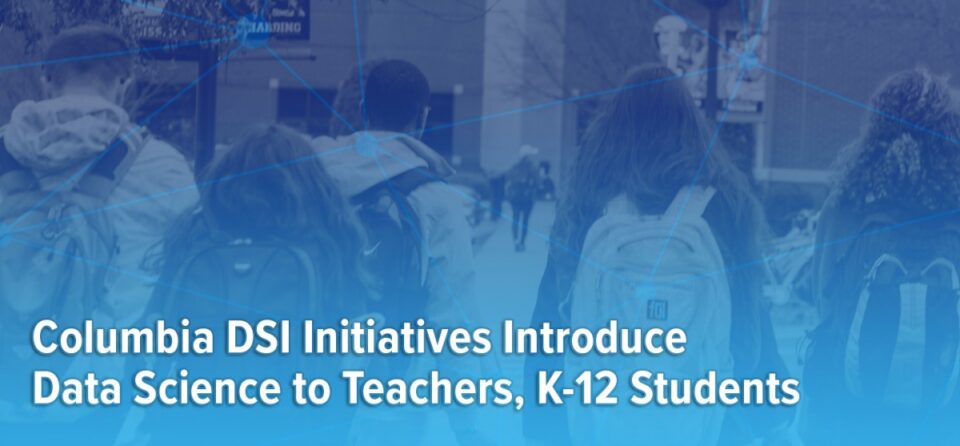Columbia DSI Initiatives Introduce Data Science to Teachers, K-12 Students
February 18, 2020

Data science is expanding rapidly in higher education. Colleges and universities around the world adds data science as a major, a center, or as a separate college. But at the K-12 level, few schools have implemented data science in their classrooms. To bridge that gap, the Data Science Institute at Columbia University (DSI) has several initiatives to help K-12 teachers and students learn the foundations of data science.
Data Science for High School Computer Science Workshop
The Northeast Big Data Hub produced a workshop at Cornell Tech to explore ways in which data science may be taught in high schools while articulating a pathway toward data literacy for students and teachers. Co-organized by the New York Hall of Science, the workshop brought together a diverse group of participants involved with data science education at the high school level, including teachers, university professors, data scientists, National Science Foundation leadership, and a representative from the The College Board, which is exploring how data science may be taught as part of Advance Placement programs, as a standalone course, or to integrate it into current curricula. Through talks, open discussion, and breakout activities, participants also discussed how a data science curriculum may form a bridge between computational thinking and real world problems. A forthcoming report summarizing the findings and opportunities in K-12 data science education will soon be available here.
Data Science in the Classroom
This summer 2019 workshop explored how K-12 teachers may introduce the subject in their classrooms. Held at Columbia’s Teachers College, the event featured three DSI speakers: Jeannette M. Wing, Avanessians director; Tian Zheng, associate director for education; and Sharon Sputz, executive director of strategic programs. All three spoke about the benefits of having K-12 students understand the data revolution that is enveloping their everyday lives by way of cellphones and computers. Two data scientists led sessions for the teachers on how to engage students with data science projects. One session was led by Ipek Ensari, a postdoctoral fellow who has developed projects teachers can use to teach data science. She demonstrated a data project for children who attended Columbia’s Family STEM Day, an annual alumni event. The project, “The Dog Data Scientists and Citizen Science,” is a data dashboard that prompts children to ask questions such as Which dogs in New York City bite the most? What’s the most popular dog name? Which breeds are most popular in the city? Once they have formulated questions, children may use the dashboard data, which comes from NYC Open Data, to answer.
AI4ALL @ Columbia
This summer 2019 program for 20 high school students taught the fundamentals of artificial intelligence (AI) as well as how to understand the ethical questions surrounding the technology. Two DSI-affiliated professors, Desmond Patton and Augustin Chaintreau, co-directed the program in partnership with AI4ALL, a nonprofit that aims to increase gender and racial diversity in high-tech fields, to make the field of AI more inclusive, equitable and democratic and help the development of AI products that contain less bias. “Now that AI algorithms routinely make decisions about who is invited to job interviews, who is eligible for a mortgage, and who is a candidate for surveillance by law enforcement it becomes an ethical problem for all of society,” said Patton, who is an associate professor at Columbia’s School of Social Work. Patton also founded a similar summer program, Digital Scholars Lab, in 2017.
Research Experience for Teachers
Ten New York City science and mathematics teachers have spent two summers at Columbia to learn the intricacies of advanced wireless technologies and how to design wireless-tech lab experiments for their students. At the end of the two summer sessions, the teachers were given COSMOS educational toolkits composed of PCs, wireless devices, sensors, and software-defined radios. Their students get to use the toolkits, which connect to the web and to the COSMOS testbed, allowing them to follow experiments done by the researchers who are creating the wireless network. Columbia and NYU researchers will visit their classrooms and mentor them. The program is part of a $22.5 million National Science Foundation project, Cloud Enhanced Open Software Defined Mobile Wireless Testbed for City-Scale Deployment, or COSMOS. Researchers from DSI, Columbia Engineering, NYU, and Rutgers are designing an advanced wireless testbed that is being deployed in West Harlem. The high-bandwidth wireless network will allow data to be transmitted faster than one gigabit per second and reduce response times to a few milliseconds. It will enable researchers from anywhere in the country to log in and test their ideas for improving network performance and for creating city-focused applications. The COSMOS research team wanted to share the technologies with K-12 teachers and students, so that they could keep abreast of and master the latest technologies. Zoran Kostic, associate professor of electrical engineering led the Columbia effort along with Columbia Engineering outreach office. The initiative is also supported by grants from AT&T and Verizon, which awarded the COSMOS team a $100,000 Verizon 5G EdTech challenge award to enrich curriculum in under-resourced middle schools by creating an educational toolkit focused on wireless technology.